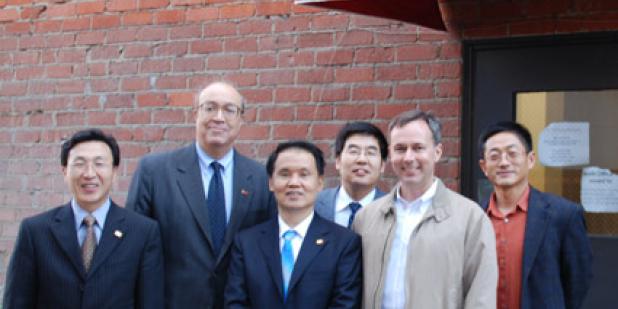Happy Lunar New Year from the USC US-China Institute!
Chinese Communist Party and State Council Delegation visits USC

The lunar new year is this week and nearly two hundred million Chinese are hurrying to return to their sometimes quite distant homes. Heavy snows and energy shortages are halting trains and buses and leaving tens of millions stranded. More than fifty people have been killed in weather-related accidents. Aware of the vulnerability of travelers and mindful of how important the holiday is for people, Chinese Prime Minister Wen Jiabao made a well-publicized trip to South Central China and apologized to travelers stranded at the Changsha rail station. The government has ordered the army and police to set up shelters and to deliver food to people stuck on immobile trains. It is also implementing rolling blackouts and other energy conservation measures.
This crisis and the government’s response to it was one of the topics addressed at USC on January 30 by Li Zhongjie 李忠杰, head of a high level delegation from China. Li, Vice Minister of the Chinese Communist Party’s Party History Research Office, was the principal author of Party General Secretary Hu Jintao’s report at the recent National Party Congress. Li and the delegation met with USC researchers to discuss challenges confronting China and how the Party and government intend to address them. Most of the discussion focused on the government’s intention to continue pressing ahead with economic reform and international engagement, but Li also spoke about how these snowstorms demonstrated shortcomings in the government’s ability to implement emergency plans.
Li highlighted four themes from the report: 1) China’s economic reforms have produced remarkable progress, lifting hundreds of millions from poverty and having a positive and measurable effect on life expectancies and other measures. 2) The aim now is to continue these advances so that by 2020 China’s can be considered a moderately prosperous society. Long-term sustainability is part of this aim, through more efficient energy use and working to better protect the environment. 3) Such sustainable development will require a more systematic approach to social planning and economic decision-making. This “scientific development” effort is to bring greater numbers of people into the planning and decision-making process and will include a focus on addressing inequalities within and across regions and fostering innovation. 4) China’s leaders argue that China’s rise need not produce international strains. The government intends to work collaboratively to address global challenges. In response to a question, Li argued that differences among nations need not lead to conflict. Li noted that many in China are closely following the American presidential campaign and news about American economic woes, wondering about possible implications for U.S.-China relations and China’s economy.
hundreds of millions from poverty and having a positive and measurable effect on life expectancies and other measures. 2) The aim now is to continue these advances so that by 2020 China’s can be considered a moderately prosperous society. Long-term sustainability is part of this aim, through more efficient energy use and working to better protect the environment. 3) Such sustainable development will require a more systematic approach to social planning and economic decision-making. This “scientific development” effort is to bring greater numbers of people into the planning and decision-making process and will include a focus on addressing inequalities within and across regions and fostering innovation. 4) China’s leaders argue that China’s rise need not produce international strains. The government intends to work collaboratively to address global challenges. In response to a question, Li argued that differences among nations need not lead to conflict. Li noted that many in China are closely following the American presidential campaign and news about American economic woes, wondering about possible implications for U.S.-China relations and China’s economy.
A question about efforts to curb corruption sparked an extended response from Li. He noted the corrosive impact corruption has on popular attitudes toward the Party and the government and its officers and acknowledged that corruption has grown with economic expansion. Li argued, though, that both the Party and government were taking action to address the problem. He noted that investigations had resulted in the arrest and imprisonment of officials both high and low. Li cited the conviction of former politburo member Chen Liangyu as an example that even top officials were not immune from prosecution. Li detailed a number of preventive measures that were underway, including a “scared straight” program where officials are taken to prisons to hear from corrupt officials who are now doing time. Clearly Chinese leaders are sensitive to the potential corruption or perceptions of corruption have to generate popular discontent.
In addition to Vice Minister Li Zhongjie, the delegation included Zhang Junkao (张军扩) , director of the State Council Development Research Center, Chen Yaoyao (陈遥遥), director of the State Council Information Office, and Cai Yue (蔡悦) of the Ministry of Foreign Affairs.
***
Related article on Chunyun, the annual spring festival (lunar new year) migration.
Featured Articles
We note the passing of many prominent individuals who played some role in U.S.-China affairs, whether in politics, economics or in helping people in one place understand the other.
Events
Ying Zhu looks at new developments for Chinese and global streaming services.
David Zweig examines China's talent recruitment efforts, particularly towards those scientists and engineers who left China for further study. U.S. universities, labs and companies have long brought in talent from China. Are such people still welcome?






